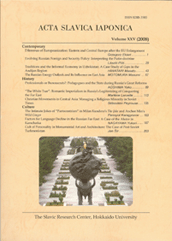Evolving Russian Foreign and Security Policy: Interpreting the Putin-doctrine
Evolving Russian Foreign and Security Policy: Interpreting the Putin-doctrine
Author(s): László PótiSubject(s): Politics / Political Sciences
Published by: Slavic Research Center
Summary/Abstract: Writing about Russian foreign policy is always topical, but particularly in recent years as Russia has markedly increased its foreign policy profile, undoubtedly the most powerful Russia in world affairs since the demise of the Soviet Union. Russia has also made radical shifts in some traditional areas of its foreign policy. Additionally, in 2008 Russia will elect a new president who will formally put an end to the Putin-era.1 Thus, a preliminary evaluation of the Russian Federation’s second president’s foreign policy performance seems appropriate at this juncture. In this article I do not aim at a systematic analysis of the 8 years of Putin being in office, rather, I would like to focus on those points that reveal the novel content of what sometimes is termed “Putin-doctrine” with some emphasis on East-Central Europe. In doing so, I will start by analyzing the contours of the new Russian security policy taking shape since 2003. Further, I will examine Russian-European relations and within that I put a special emphasis on the Russian policy towards Central Europe. Finally, I try to characterize the tremendous changes in Russian foreign policy since 2006.
Journal: Acta Slavica Iaponica
- Issue Year: 2008
- Issue No: 25
- Page Range: 29-42
- Page Count: 14
- Language: English

